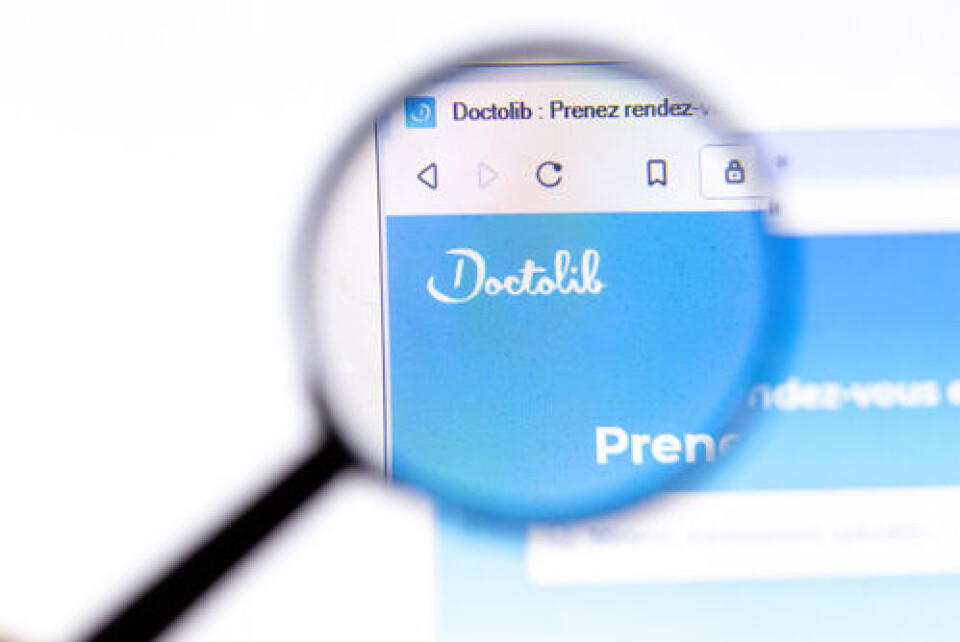-
Ryanair brings back Brive-Stansted service for summer 2026
Route was one of several axed last winter
-
Red weather alerts continue as Storm Nils sweeps France
Driver killed in south-west after tree branch falls on his lorry
-
French crisps brand gains global attention after Dua Lipa post
Singer posted photo of her shopping basket and the only food items were Brets crisps in braised chicken, honey mustard, and ‘Fromage du Jura’ flavours
French health site Doctolib to ban unregulated wellbeing practitioners
The booking platform said that it will focus ‘exclusively on practitioners with references from health authorities’, with naturopaths and hypnotherapists banned

Online appointment platform Doctolib has confirmed that it will remove more than 5,700 ‘unconventional’ medical practitioners from its books over the next six months.
These will include ‘wellbeing’ specialists, including naturopaths, sophrologists, and hypnotherapists.
Doctolib soared in popularity over the Covid pandemic as it was used by millions to help book vaccination slots. However, it also offers appointment booking for a wide variety of medical services.
The platform attracted controversy two months ago when it emerged that it has thousands of listings for ‘unconventional’ medical practitioners, some of whom allegedly do not need any medical certifications or qualifications to practice.
Read more: French Doctolib platform accused of ‘promoting alternative medicine’
The polemic centred particularly on naturopaths, with some accusing them of being “charlatans”, and one even allegedly offering ‘cures’ that included asking patients to “drink their own urine”.
These accusations included controversial figures such as Irène Grosjean and Thierry Casasnovas. Both are ‘influencers’ online with large followings, but their claims have been repeatedly discredited in the healthcare world.
At the time, Doctolib said that it was not its place to "decide" or take sides in the debates that surround alternative medicine.
In a Tweet, it said that only “3% of its users practise an activity that comes under the ‘wellbeing’ or ‘medical-social’ umbrella. Their activity is legal, but they are of course not health professionals. Appointments with these practitioners represent just 0.3% of the appointments made with Doctolib.”
It added: “Society is evolving, and…some patient associations are promoting access to complementary therapies. We consider that it is not the role of Doctolib to decide on these debates.”
U-turn ban
In sharp contrast to its earlier stance, Doctolib has now confirmed that it will “recentre itself exclusively [on practitioners] with references from authorities”.
In a statement, Doctolib president Stanislas Niox-Chateau said: “We have decided to focus exclusively on professionals with references from health authorities. 5,700 ‘wellbeing’ practitioners will no longer.be able to use our services….They have six months to find another solution.”
The practitioners affected have been informed that their contracts will not be renewed.
Immediately after the controversy in August, Doctolib suspended 17 profiles in a bid to “strengthen its verification procedures”, and especially stopped practitioners from being able to take appointments before they had received their diplomas or approval to practice.
After “six weeks of consultations”, the platform said, it saw no other option but to ban the practitioners from its site. It declined the option to ban naturopaths only.
Mr Noix-Chateau said that the platform was considering other options, but had ruled out the suggestion to create a second booking site for these ‘wellbeing’ specialists.
He said: “Wellbeing activities have their place, but they are not regulated, and there is no way to check their level of qualification.”
He said that he could not let this group risk the reputation of Doctolib, which is held to “legitimate expectations” by health professionals, who make up the bulk of its clientele in France.
It has listings for more than 170,000 doctors, dentists, nurses, midwives, psychologists, and osteopaths, who use it for appointment booking and teleconsultations.
Related articles
French naturopaths rebut criticism after Doctolib website controversy
French Doctolib platform accused of ‘promoting alternative medicine’
























